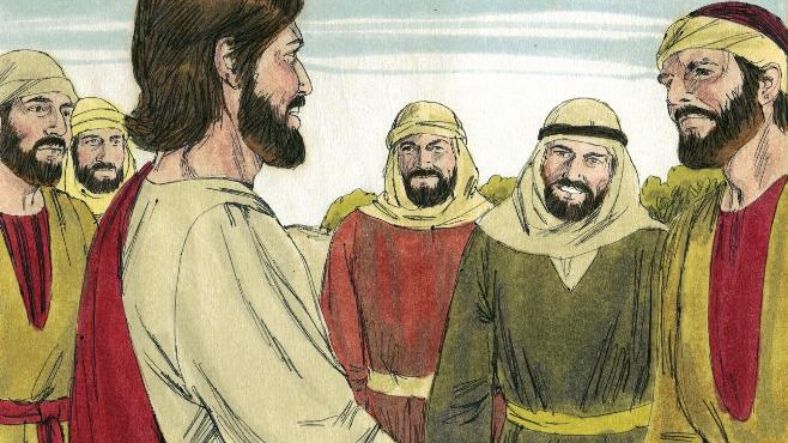Acts 10 and 11
- “Mr. Jones, no more salt in your diet. And I am sorry to press you, but you must lose 40 pounds. . . .”
- “Honey, the doctor’s report came back today. We are having a baby.”
- “The honor of your presence is requested at the wedding of …”
- “He is survived by his wife, two sons and a daughter.”
All of the above firmly declare, “Things are changing!” Whatever our response, life will never be the same again.
Young people may imagine that they are good at changing, while viewing Mom and Dad as stuck in a rut. But do young people relish changes like:
* Putting gas in Dad’s car when they are used to free fuel?
* Fixing dinner once a week instead of expecting mom to fix dinner
seven days a week?
* Doing the laundry because Mom isn’t around?
No one enjoys being stretched. Change is tough. We resist changes that require us to serve others or be less self-oriented.
Lack of vision hinders change. In 1867 the following news items appeared in the Chicago Federation News: “Joshua Coppersmith has been arrested in New York for attempting to extort funds from ignorant and superstitious people by exhibiting a device which he claims will convey the human voice any distance over metallic wires so it will be heard by listeners at the other end. Well-informed people know it is impossible and of no practical value. The authorities who apprehended this criminal are to be congratulated.”
One of God’s change-agents (Peter) hindered change until he was changed. In Acts 10 and 11 we see change coming on a huge scale. Jews and Gentiles were deeply divided. God’s plan for world evangelism required Jewish Christians to leap the social and cultural gulf that was centuries deep and wide. Consider these four examples of Jewish hate for Gentiles:
- “Shake the dust off your feet” was a proverb that expressed Jewish exclusiveness. If dirt was tracked into Israel from another nation, the Jews believed it never mingled with the native soil, and never blended in. It continued to defile.
- No self-respecting Jew would drink milk drawn from a cow by Gentile hands.
- A weaver’s shuttle, made from a tree that might have accommodated Gentile worship of false gods, was burned. And every piece of cloth made with that weaving device was fit only for the fire.
- Extremists held that a Gentile woman in labor should not be assisted, since she was only bringing another dog into the world.
The Apostle Peter was not hankering for a change in his world and life view when God geographically maneuvered him toward his revolutionary appointment in Acts 10.
The Geography Change in God’s plan is found in Acts 1:8—“Jerusalem, Judea, Samaria and the uttermost parts of the earth.” The Apostle Peter had been a key player in Jerusalem and Judea The single remaining destination of the Gospel was “the uttermost parts of the earth”—meaning Gentiles.
Though Peter knew of Philip’s work among the Samaritans—a huge step that shattered barriers – he wasn’t ready to reach out to Gentile dogs because Ephesians 2:11-14 had been his mental breakfast as far back as he could remember. It was going to be tough for God to engineer Gentile salvation.
Somehow Peter stayed with Simon, a man who dealt in dead animal pelts (9:43). What a shock to his orthodox system—it carried him to the outer limits of liberalism. But a stiffer challenge awaited—being an evangelist to a Gentile—Cornelius.
But God made it as easy as possible for Peter. There was as little as possible for Peter to dislike. Cornelius was as respectable, nice, generous and as reverent as a ranking Roman could be. Peter could even like this Mr. Clean. God asked Peter for the smallest possible change.
Who’s Hardest to Convince? How much of Acts 10 and 11 focuses on God changing Peter? How much on Cornelius? The text emphasizes and dwells on maneuvering Peter toward change. There is less detail about Cornelius. Before the Hebrew-Christian apostle would sit down pleasantly with the Gentile war-mongering Roman, God had to soften the religious one. To get them together, He sent each man a vision.
Cornelius did not fear to tell his family and military subordinates that he wanted to send for a Jewish fisherman. He was willing to be subject to a Jewish peasant.
How a Change in Menu Indicated a Change in Membership God said, “Rise Peter, kill and eat.” “What does a menu matter have to do with a membership matter?” wondered Peter (Acts 10:9-20). Was this a contradiction or a calendar development? This was a calendar development. God was doing something new.
When the messengers arrived from Cornelius, Peter must have sensed something big was coming because he took six others along to vouch for whatever would happen. He sensed what was about to happen could be controversial and he wanted witnesses that he had acted wisely.

Recent Comments